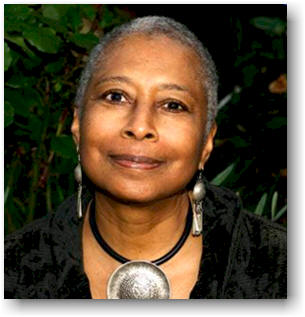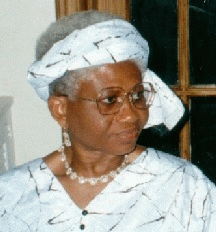
Today’s open thread will highlight some well-known womanists.
Womanism is a social theory deeply rooted in the racial and gender oppression of black women. There are varying interpretations on what the term womanist means and efforts to provide a concise and all encompassing definition have only been marginally successful. Yet, the presence of ambiguity within the theology allows for its continuous expansion of its basic tenets.
At its core, womanism is a social change perspective based upon the everyday problems and experiences of black women and other women of color, but more broadly seeks methods to eradicate inequalities not just for black women, but for all people. The self- authored spirit of activism, spirituality, and the women’s relationship with herself, other women, and her surroundings comprise an essential part of the ideology.
The term womanism was first coined by author, Alice Walker in her 1979 short story, “Coming Apart.” Here Walker describes the protagonist of the story as a womanist. Although Walker is credited for the term, there are other contributors to the womanism movement. These contributors developed their own womanist theories independently of Walker’s womanism. They include scholars such as Clenora Hudson-Weems and Chikwenye Okonjo Ogunyem.
A need for the term “womanism” arose during the early Feminist Movement, which was mainly led by middle-class white women advocating for social change in the form of women’s suffrage. While the Feminist Movement focused on ending gender-based oppression, it largely ignored race and class-based oppression. The height of this academic discourse occurred during the late 1980’s when scholars such as Cleenora Hudson-Weems, and Chikwenye Okonjo Ogunyemi began to share their findings with the world. During this time, womanism was embraced, debated, and dismissed by academics, mainly due to its perspective on the African-American experience. The 1990’s presented a new kind of challenge with the proliferation of black feminism within women’s studies. As a result, womanism fell beneath the radar of the public eye, but academic discourse progressed, and scholars continued to contribute to and explore the discipline. By the early 2000’s, womanism had resurfaced as a unique social change perspective. This was further cemented by the publication of The Womanist Reader in 2006, a collection of womanist essays and critiques.
Author and poet Alice Walker first utilized the term “womanist” in her work, In Search of our Mother’s Gardens: Womanist Prose. She explains that the term womanist is derived from the southern folk expression “acting womanish.” The womanish girl exhibits willful, courageous, and outrageous behavior that is considered to be beyond the scope of societal norms.
Walker’s definition also holds that womanists are universalists. This philosophy is further invoked by her metaphor of a garden where are all flowers bloom equally. A womanist is committed to the survival of both males and females and desires a world where men and women can coexist, while maintaining their cultural distinctiveness. This inclusion of men provides Black women with an opportunity to address gender oppression without directly attacking men. A third definition provided by Walker pertains to the sexuality of the women portrayed in her review of “Gifts of Power: The Writings of Rebecca Jackson.” Here, she argues that the best term to describe Rebecca Jackson, a black Shaker who leaves her husband and goes on to live with her white Shaker companion, would be a womanist, because it is a word that affirms the connection to the world, regardless of sexuality. The seemingly contrasting interpretations of womanism given by Walker validates the experiences of African- American women, while promoting a visionary perspective for the world based on said experiences.
 Clenora Hudson-Weems is credited with coining the term Africana Womanism. In 1995, the publication of her book, Africana Womanism: Reclaiming Ourselves sent shockwaves through the Black nationalism community and established her as an independent thinker. She rejects feminism as the theology of Africana women, that is to say women of the African diaspora, because it is philosophically rooted in Eurocentric ideals. She further asserts that it is impossible to incorporate the cultural perspectives of African women into the feminism ideal due to the history of slavery and racism in America. A large part of her work mirrors separatist Black Nationalist discourse, because of the focus on the collective rather than the individual as the forefront of her ideology. Weems refutes Africana womanism as an addendum to feminism, and asserts that her ideology differs from Black feminism, Walker’s womanism, and African womanism.
Clenora Hudson-Weems is credited with coining the term Africana Womanism. In 1995, the publication of her book, Africana Womanism: Reclaiming Ourselves sent shockwaves through the Black nationalism community and established her as an independent thinker. She rejects feminism as the theology of Africana women, that is to say women of the African diaspora, because it is philosophically rooted in Eurocentric ideals. She further asserts that it is impossible to incorporate the cultural perspectives of African women into the feminism ideal due to the history of slavery and racism in America. A large part of her work mirrors separatist Black Nationalist discourse, because of the focus on the collective rather than the individual as the forefront of her ideology. Weems refutes Africana womanism as an addendum to feminism, and asserts that her ideology differs from Black feminism, Walker’s womanism, and African womanism.
Chikwenye Okonjo Ogunyemi is a Nigerian literary critic. In 1985, she published the article, ” Womanism: The Dynamics of the Contemporary Black Female Novel in English,” and described her interpretation of womanism. She asserts that the womanist vision is to answer the ultimate question of how to equitably share power among the races and between the sexes. She arrived at her interpretation of the term independently of Alice Walker’s definition, yet there are several overlaps between the two ideologies. Rather than citing gender inequality as the source of Black oppression, Ogunyemi takes a separatist stance much like Hudson- Weems, and dismisses the possibility of reconciliation of white feminists and black feminists on the grounds of the intractability of racism.


